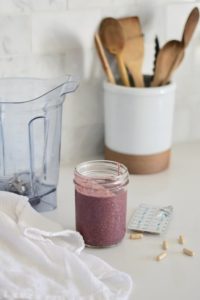How to choose your herbal and nutritional supplements
There are such a wide array of herbal and nutritional supplements available right now, and with the global dietary supplements market expected to reach USD 278.02 billion by 2024 the uptake in usage of these supplements by consumers does not appear to be slowing down anytime soon. Many common herbal and dietary supplements have large price differentiation, with powerful direct-to-consumer marketing along with over-the-counter and online availability meaning many people are self-selecting their own supplements, but how do you decide which ones to choose?

Not all supplements are created equal. Many supplements come in different forms, and some of these have been shown to be more bioavailable than others. For example, magnesium supplements come in forms oxide, chloride, sulphate, carbonate, acetate, pidolate, citrate, gluconate, lactate or aspartate, with studies showing different bioavailability of each of these. Bioavailability refers to the amount of the supplement (and indeed pharmaceutical drug) that is absorbed into the bodies circulation and is therefore available to have therapeutic benefit. For drugs to receive approval they undergo thorough bioavailability testing, especially in phase 1 and phase 2 trials. If a company is producing a generic drug to rival an already approved branded drug they have to show within a 90% confidence interval that their drug rivals the approved alternative. Despite improved regulation in the supplement industry some renegade supplement companies produce their products without demonstrating or even ascertaining the bioavailability and therapeutic potential of their products. To complicate matters, nutrients also often work synergistically, meaning that studies need to be performed in different ways to drug trials; for example, it has been shown that high levels of zinc supplementation may offset magnesium absorption. It may also be pointless taking supplements in dosages below that which has been shown in trials to be efficacious.
What about herbal supplements? In the UK the traditional herbal registration (THR) scheme – which is overseen by Medicines and Healthcare products Regulatory Agency (MHRA) – provides a framework whereby manufacturers of good quality herbal products can register these as medicines based on ‘a tradition of use’. This means that a herbal product has been used traditionally for at least 30 years (15 years ‘non-EU’ and 15 years in the EU, or more than 30 years in the EU). This not only allows the manufacturer to make a restricted medicinal claim on the packaging (e.g. ‘A traditional herbal medicinal product used to relieve the symptoms of slightly low mood and mild anxiety exclusively based on tradition of use only’), but importantly, the THR means the herbal product has been assessed by various scientifically qualified individuals and that the company complies with certain good manufacturing specifications. Overall, this means that while the evidence for efficacy may be limited, the scheme provides an assurance that you are getting not only a good quality product, but also more reliable advice on how to use it.
This does not mean, however, that all herbal supplements are created equal. If a herbal product is not THR in the UK then it can be marketed as a food supplement. On a recent episode of the UK BBC programme “Trust me I’m a Doctor”, the issue of whether you can trust herbal supplements was discussed. They purchased 70 herbal products some of which were THRs and some which weren’t. They chose to test milk thistle, ginkgo and evening primrose oil. In every THR product tested, the product contained what was claimed on the label. However, the food supplements showed a wide range of quality. Of the food supplement products labelled as Ginkgo that were tested, 8 out of 30 (27%) contained little or no ginkgo extract. 36% of the food supplement milk thistle products contained no detectable milk thistle. All of the evening primrose food products tested did contain what the packet claimed. This shows the importance of only buying supplements from reputable companies.
In New Zealand, there is no pre-market approval of quality, efficacy or safety on herbal and nutritional supplements. The Natural Health and Supplementary Product bill was not reinstated by the new Government and no announcement has yet been made for how these products may be ‘regulated’ in NZ. With so many brands on the market, and clients accessing products from offshore websites to save on costs, the quality of these products cannot be guaranteed. I am a strong advocate of accessing professional consultation and recommendation before spending money on herbal and nutritional supplementation – and do not be afraid to ask questions about the products you are recommended regarding the evidence base behind their use and formulation.
After undergoing rigorous clinical training and obtaining a Nutritional Therapy Practice Diploma which integrates with my Master of Science (Personalised Nutrition), I prefer a food-first approach to health, but where I do recommend supplements I ensure these are from reputable companies, using therapeutic dosages and bioavailable forms. Sometimes this means more expensive supplements than you may obtain elsewhere, but that you know what you are getting. I also ensure that I check all recommended supplements for potential interactions with your prescribed and over-the-counter medications, and advocate for working collaboratively with your other health professionals – something you don’t get when purchasing your own supplements without professional guidance. Yes, the cost of the products you find elsewhere may be less than the professional or ‘practitioner-only’ ranges I recommend, but you may also consider as I do that anything other than quality, safe and effective supplementation is a waste of money.
You are invited to book a COMPLIMENTARY 15-minute chat to discuss your health goals here. I look forward to supporting you.








